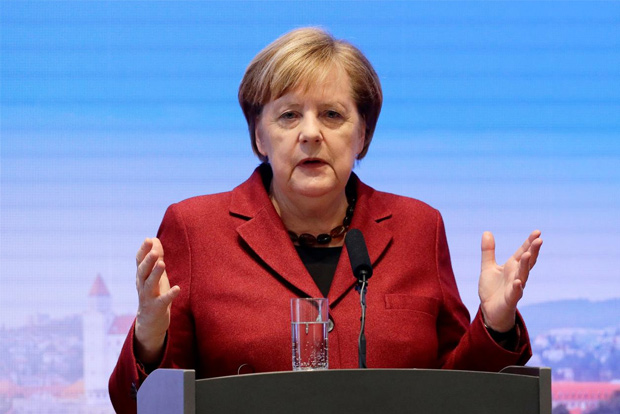German coalition parties try to unblock stimulus impasse
Germany’s measures, which together with liquidity aid and loan guarantees equal more than 30% of its economic output, go substantially beyond any other national emergency programmes launched by other euro zone countries.

Berlin
German Chancellor Angela Merkel’s coalition resumed negotiations on a massive stimulus package on Wednesday after party leaders deadlocked over cash incentives to buy new cars and extra relief for highly indebted municipalities.
Members of Merkel’s conservative bloc and the centre-left Social Democrats (SPD) convened in the chancellery and talks were expected to extend into the afternoon or evening, coalition sources said.
The package is expected to include up to 100 billion euros ($112.16 billion) of measures to help firms and workers rebound from the coronavirus crisis, which is likely to pitch Europe’s largest economy into its deepest recession since World War Two.
The stimulus programme follows a 750-billion-euro rescue package agreed in March which encompassed a debt-financed supplementary budget of 156 billion euros.
Two persons with knowledge of the discussions told Reuters the government was thinking about a second supplementary budget, though large parts of the stimulus package were likely to be financed with the more than 70 billion euros of still unused funds from the first package.
Germany’s measures, which together with liquidity aid and loan guarantees equal more than 30% of its economic output, go substantially beyond any other national emergency programmes launched by other euro zone countries.
The sheer scale of Germany’s new spending splurge has raised concerns among officials from economically weaker countries that the discrepancy in aid measures could worsen imbalances in the bloc and distort the European Union’s single market.
“TRANSFORMATIVE”
SPD Finance Minister Olaf Scholz wants the stimulus measures to be “timely, targeted, temporary and transformative”.
Among the proposals on the table are cash handouts for families to boost consumption, extra relief for municipalities struggling with lower tax receipts, and further funds for companies with fewer than 250 employees.
Economy Minister Peter Altmaier, a conservative, has suggested additional support for the auto industry, including subsidies for environmentally friendly technologies and cash incentives to buy new cars with zero or low carbon emissions.
But SPD leaders insisted on Tuesday that any cash-for-clunkers programme must exclude vehicles with combustion engines as this would undermine Germany’s climate protection goals.
Scholz wants to help municipalities, in charge of a large chunk of public investment in Germany, with a cash injection worth 12 billion euros to compensate for plunging tax revenues, plus relief for heavily indebted towns worth 45 billion euros.
The conservatives oppose debt relief for municipalities, but have signalled a willingness to help towns with other measures such as more federal funds for schools and roads.
Despite the differences, Labour Minister Hubertus Heil said he was optimistic that coalition parties would agree on a big stimulus package that would strengthen the economy and help workers recover quickly from the pandemic.
Speaking to reporters in Berlin after data showed a further rise in unemployment in May, Heil said firms had put around 6 million people on reduced working hours under the government’s “Kurzarbeit” short-time working scheme as of the end of April.
“That’s why it’s important now that the stimulus package will give a strong impulse for economic growth and job security,” Heil said. “It’s about supporting investments and purchasing power.”
Visit news.dtnext.in to explore our interactive epaper!
Download the DT Next app for more exciting features!
Click here for iOS
Click here for Android



